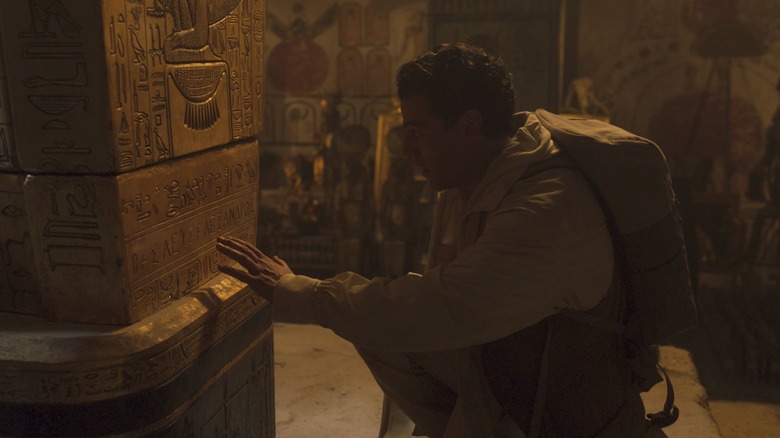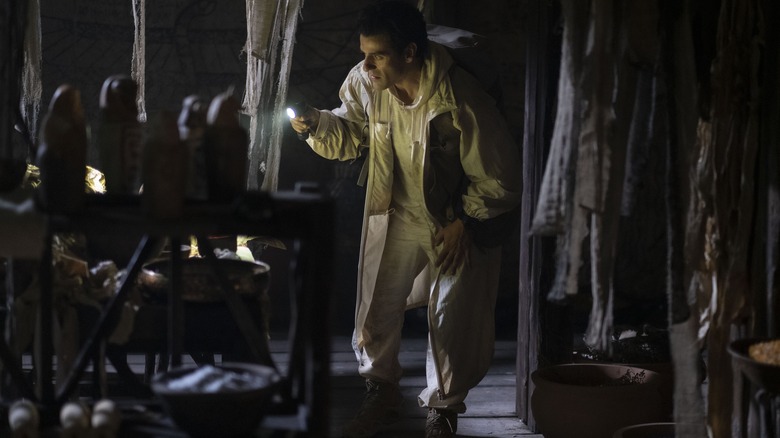Moon Knight Busts These Hollywood Myths About Egyptian Culture
In the first episode of "Moon Knight," we see the disheveled (though no less enthusiastic) Steven Grant doing his best tour guide impression for a young visitor to the British Museum, expressing his passion for ancient Egyptian culture and patiently breaking down their beliefs into easily digestible facts for his captive audience of one. Talk about a tone-setter!
Through a combination of pop culture osmosis and years of school history classes, casual viewers will no doubt be familiar with the general stereotypes about the society that built those magnificent pyramids — sphinxes, cursed tombs, the gnarly process of mummification, a rich and vivid conception of the afterlife, all that good stuff. Yet part of what "Moon Knight" director Mohamed Diab set out to do with his episodes of this Marvel series was to broaden our horizons about just how much the African nation and its populace truly have to offer beyond lazy assumptions and harmful misconceptions.
Diab actually stated as much when the mythology-heavy series first made its way to Disney+ several weeks ago, explaining how authentic casting of Arab actors became an important "first step" to normalizing a culture that is too often perceived as alien. After countless instances of whitewashing, casual orientalism, and the tired practice of washed-out yellow filters (predominantly used to connote "third world" countries) throughout Hollywood productions in decades past, Diab took the opportunity as an Egyptian-born artist to set the record straight. As he said in another interview:
"In my pitch, there was a big part about Egypt, and how inauthentically it has been portrayed throughout Hollywood's history. It's always exotic -– we call it orientalism. It dehumanizes us. We are always naked, we are always sexy, we are always bad, we are always over the top."
On the surface, "Moon Knight" serves as yet another expansion of the Marvel Cinematic Universe, bringing in even more supernatural flair through Marc Spector's service to the Egyptian god Khonshu. But far more importantly, those behind the streaming series also go to admirable lengths to depict Egyptian culture with as much nuance, respect, and attention to detail as possible.
Righting past wrongs
In order to truly appreciate what "Moon Knight" gets right about its setting and mythology, it helps to first familiarize oneself with the many, many movies and shows in years past that got things woefully wrong. In the lead-up to the debut of the new Marvel series, director Mohamed Diab made waves by directly calling out other blockbuster productions for various mishandlings of stories set in the Middle East. Although easily misinterpreted as taking potshots at the competition in the (largely exaggerated) Marvel vs DC "war," Diab took aim at films like "Wonder Woman 1984" and the upcoming "Black Adam" for perpetuating and reinforcing negative depictions of the people and places involved.
Diab forcefully spoke out against the upcoming "Black Adam" for opting to set the Dwayne Johnson-starring film in a fictional country rather than Egypt proper, though he also acknowledged that this is understandable given the specific comic run that the DC movie is following:
"I was really annoyed with DC when they set 'Black Adam' in a fictional Middle Eastern country as an excuse to cast non-Egyptians, when it was obviously meant to be in Egypt. Representation opportunities shouldn't be wasted. But it's not a full mistake since it's based on an iteration of the comics that doesn't mention Egypt."
A much less forgivable example stemmed from a controversial moment in "Wonder Woman 1984," which saw Gal Gadot's eponymous superhero end up near Cairo, Egypt for a spectacular action sequence set in the arid desert. The various visual inconsistencies and inaccurate portrayal of the nation's customs rankled Diab in particular. In his own words:
"You never see Cairo. You always see Jordan shot for Cairo, Morocco shot for Cairo, sometimes Spain shot for Cairo. This really angers us. I remember seeing 'Wonder Woman 1984' and there was a big sequence in Egypt and it was a disgrace for us. You had a sheik –- that doesn't make any sense to us. Egypt looked like a country from the Middle Ages. It looked like the desert."
Though no individual movie should bear the brunt of inauthentic cultural depictions, it's easy to see why any one of these instances would feel like a breaking point. Classics such as "Cleopatra," "The Ten Commandments," "The Mummy," and even those of recent vintage like "Indiana Jones" or "Exodus: Gods and Kings" show how far we still have to go.
What Moon Knight gets right
So with all that important context established, how does "Moon Knight" address these potentially thorny issues?
First of all, there's the casting of May Calamawy as Layla El-Faouly, the estranged wife of Oscar Isaac's Marc Spector and an important addition of authentic Arab representation. In fact, IGN revealed that Mohamed Diab was responsible for changing the character's background from half-Egyptian to fully Egyptian. The director previously explained how this approach extended to multiple levels of production on "Moon Knight," including composing and editing:
"And what we did on 'Moon Knight' was the first step of trying to normalize us as human beings, through the Layla (May Calamawy) character. It's very important to see us. And by the end of the show, there's going to be a couple of surprises about Egypt that are very important. So I would call this a very important first step into understanding our culture a little bit. I also got an Egyptian composer [Hesham Nazih], and one of the three editors is Ahmed Hafez, an Egyptian. Even the rap songs and music that we used were all [producer] Sarah [Goher]'s suggestions. But I'm so proud of it, and I feel like it's going to give you an experience and a feeling that is unique and different."
Additionally, another encouraging development has been the fact that the material covered in "Moon Knight" itself displays a healthy curiosity and respect for Egyptian culture and heritage. Scenes that include fantastical (but also deeply mythological) moments like the council of Egyptian gods in episode 3 could've easily been played for laughs with the MCU's usual brand of quippy and self-aware jokes. Instead, the series has been careful to avoid villains who might otherwise amount to offensive ethnic caricatures, instead using Ethan Hawke's outsider Arthur Harrow as an intrusive and disrupting force for evil.
To be sure, the creative team hasn't shied away from embracing the entertaining sci-fi and comic book influences inherent in Moon Knight and his assorted enemies, ranging from reanimated Heka Priests to supernatural jackals to the Egyptian diety Ammit. But by keeping a commitment to cultural sensitivity and authenticity at the heart of the show, "Moon Knight" has been able to have its cake and eat it, too, busting every Hollywood myth about Egypt in the process.


